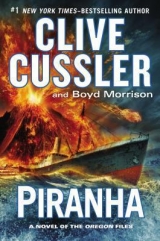
Текст книги "Piranha"
Автор книги: Clive Cussler
Жанр:
Политические детективы
сообщить о нарушении
Текущая страница: 21 (всего у книги 25 страниц)

By midday the Oregon had reached the Dominican Republic’s largest northern port, Puerto Plata. Lake Péligre was situated almost directly in the center of Haiti and would require travel over twisting and rutted roads; it would take Linda and her team seven hours to make the two-hundred-and-seventy-five-mile journey. The easier part was getting their transportation into the country.
Normally, prior approval from the customs office was required to off-load cargo, but greasing palms of the DR’s low-paid civil servants took care of the “misunderstanding” that the clearance hadn’t been preauthorized. Then after the thirty minutes needed to unload the PIG, the Oregon put back to sea. Crossing the border by land into Haiti unhindered would require another generous bribe.
Linda checked, but no one was following. Eric, who was riding shotgun in the truck’s four-person cab, confirmed that they weren’t being tracked electronically. If Kensit were watching them with the neutrino telescope, they’d never know. MacD and Hali sat in the backseat, rechecking their gear.
Since Max was the one who’d designed the vehicle, he was given the honor of naming it and he dubbed it Powered Investigator Ground, but, much to his chagrin, everyone else in the crew simply referred to it as the PIG. It was the Corporation’s land-based version of the Oregon herself. To an outside observer, the PIG seemed to be nothing more than a beat-up cargo truck carrying fuel drums, down to the logo of the fictitious oil company on the side. The rear could even be opened by dockside inspectors, who could remove the six full drums that served as the vehicle’s spare fuel and that could extend its range to eight hundred miles. Removing the first row of drums revealed a second row that was merely a façade hiding the rest of the PIG’s interior. They took the calculated risk that no one would ever go to the trouble of completely emptying the cargo bed.
In reality, the PIG was an all-terrain platform built on a Mercedes Unimog chassis and featuring an 800-horsepower turbodiesel engine with a nitrous oxide boost that could push it over 1000. The four-person cab and cargo area that could transport ten fully equipped soldiers were armored to deflect high-powered rifle rounds, and the self-sealing tires and fully articulated suspension with two feet of ground clearance meant it could conquer any terrain short of a cliff face.
The PIG could be configured to serve any mission required, from search and rescue to mobile command station to ground assault. Much of Max’s attention had focused on its offensive and defensive capabilities. The front bumper concealed a .30 caliber machine gun, and hidden racks on either side of the truck swung down to launch guided rockets. A seamless roof hatch allowed the PIG to fire mortar barrages, while a smoke generator at the rear could belch out thick plumes.
The newest modification had been the addition of remote operation capability. The drive-by-wire system could be maneuvered by a handheld control with a range of five miles. The operator used cameras mounted on the front and rear that had both daylight and night vision settings.
Linda took several sharp turns through the city. If Kensit didn’t have the neutrino telescope trained on them, there was no way he’d be able to find them now. Although she didn’t often get the chance, Linda always liked driving the PIG the good old-fashioned manual way. There was nothing more macho than motoring along on its ultra-large tires, perched higher than any other vehicle, fully encased in a truck that could take on anything else on four wheels.
“You think Kensit’s got his eyes on us?” Hali asked, the same question everyone else was thinking.
“Let’s hope he’s too focused on the Chairman,” Linda replied as she steered the PIG onto the coastal highway.
That was the primary reason it was just the four of them and not a full assault team. The goal was to make Kensit think they were simply on a recon mission so that his attention would be elsewhere.
“Ready for the briefing?” Eric asked.
“Go for it,” Linda said, not letting her apprehension show. She didn’t like talking about this openly, but it had to be done eventually.
“Okay, the cave opening is underwater, but there is an old cement factory less than a mile away situated between the mountains and the lake, with just a dirt road leading to the highway. Limestone is the one thing Haiti has a lot of, and the cement made from it was used to build the Lake Péligre dam. Once the dam was completed, the cement plant went bust and was abandoned until it started operating two years ago under the ownership of an untraceable shell company.”
“Too coincidental, if you ask me,” MacD said.
“You’d be right,” Eric said. “The factory is producing cement, but barely. According to CIA sources, the output isn’t enough to profitably support a factory that size. And it’s low-grade stuff. You wouldn’t want your house built out of it.”
Hali leaned on Eric’s seatback. “So you think this is a cover for digging tunnels into the cave?”
“Right. Since the original entrance is now inaccessible, Kensit needed another way in. If Gunther Lutzen provided him with some kind of map of the cave system, Kensit could have drilled holes into the mountain until he found a way in and then bored a tunnel big enough to move his equipment. A cement factory would be the perfect cover to transport the waste material from the dig away without anyone noticing.”
“Ah may not be the sharpest tool in the shed,” MacD said, “but if the cave is underwater, how did Kensit build this telescope inside it?”
“Either he built a barrier to keep the lake water out and pumped it dry,” Eric said, “or the cave he’s using is above the level of the lake. Remember, cave systems can ascend and descend drastically.”
“What about intel on the cement factory defenses?” Linda asked.
“Nothing. We have to assume Bazin has his forces ready for any incursions.”
The scope of the “recon” mission was agreed to back on the Oregon. The planning had been extremely awkward because of the precautions they had to take. Without naming it, Juan referred to the sunken ship on their coldest-weather mission. Everyone on the team immediately knew that meant the Silent Sea, a Chinese junk that had gone down off the coast of Antarctica. Their mission go time tomorrow would be 1600 hours minus the number of letters in the ship’s name. Nine letters meant that they all understood the mission start time to be seven a.m. Sunrise.
As for the role of their recon mission, Juan told them that they would be his Aggie Johnston. The Aggie Johnston was a supertanker that had served as a screen for the Oregon so that it could sneak up on an enemy frigate off the coast of Libya. Linda’s mission was to provide cover for the Chairman. She and her team were the distraction for what he was planning.
Juan proposed sneaking past the guards in the cement plant using the same method he did at Karamita, which Kensit would not know was a now defunct ship-breaker yard in Indonesia. Juan asked Linda and her team to place two sets of the equipment so that they would be ready for use when the mission started. They couldn’t requisition the equipment from the ship’s stores without Kensit seeing what they were acquiring, so they planned to buy it locally in the hope that Kensit would still have his eye on the Oregon by then. Linda didn’t like using off-the-shelf equipment, but she would go over it with a fine-toothed comb to make sure it was all working properly.
“How far?” Linda asked.
Eric looked at his GPS, then craned his neck and pointed. “That should be it up on the left.”
The sign above the shop read “Buceo De Diego.” Next to the name was a red flag with a white diagonal slash through it, the international symbol for scuba diving. It had the reputation for the best equipment outside of Santo Domingo.
They all got out of the PIG and entered the shop. It wasn’t a huge establishment, but the walls were lined with all of the latest tanks, regulators, fins, and buoyancy vests.
The athletic shopkeeper, who looked like a diver himself and was busy unpacking a box of masks, said, “Buenos días. Can I help you?” The four of them obviously weren’t locals.
“Oh, good, you speak English,” Linda said as if she were a tourist relieved not to have to break out her broken Spanish.
“We get many Americans here, of course. Are you and your friends interested in a dive trip?”
“We are, but we’re planning to go on our own, so we’d like to buy our equipment.” She withdrew a thick wad of cash from her pocket.
That made the shopkeeper jump to his feet and forget his unpacking duties.
“You will not regret it,” he said, trying in vain not to stare at the pile of American dollars. “We have many of the best reefs in the world in the Dominican Republic.”
“Actually,” Linda said, pointing at a Nomad side mount tank rig, “we want to go cave diving.”

Although the sky was clear, the deck of the aging 200-foot cargo ship Reina Azul, or Blue Queen, bucked in heavy seas churned up by a storm east of Nicaragua. Dayana Ruiz longed for her sleek frigate Mariscal Sucre to slice through the waves, but this mission required a covert command. She’d selected a handpicked crew of her most trusted officers who’d collaborated with her on the smuggling operation. Their naval uniforms had been left behind in Venezuela.
For her absence, she’d given the excuse that she would be observing the UNITAS joint exercises from the deck of a Cuban frigate. A Cuban admiral who owed her a favor would provide a convincing alibi.
They were ten hours from the coast of Haiti. The Doctor had assured her that the Oregon’s destination was somewhere along the western shore, although he wouldn’t explain how he knew. Ruiz found the entire situation oddly unsettling. She wasn’t used to being kept in the dark about information. Information was power and in regard to the Doctor she had very little of either. However, the video images that he infrequently sent her showing the Oregon and her crew convinced her of the accuracy of his information but also enraged her every time she saw them. The most recent showed the ship departing from Puerto Plata on a westerly course toward Haiti, and she would make certain this would be their last rendezvous.
Taking the Mariscal Sucre into battle outside of Venezuelan territorial waters had been out of the question, especially when Ruiz was planning to attack so close to another country’s coastline. Subterfuge had been the only alternative. With a top speed of just fifteen knots and no defensive capabilities, the Reina Azul was obviously no match for the Oregon in a one-on-one duel, but hiding on her deck in plain sight was a secret that would give Ruiz the opportunity to sink her.
She scanned the horizon and saw no ships. The rudimentary radar on board confirmed that they were alone.
“Begin the test,” she said to the captain.
He relayed the orders, and Ruiz trained her eyes on a gray cargo container bolted to the deck. It looked exactly like all the other cargo containers on board, but this one held a hidden surprise.
“Raising to firing position,” a voice on the intercom said.
The roof of the container pivoted up and four green tubes two-thirds the length of the container began to rise from beneath it, forced into place by a hydraulic ram. Encased in each tube was a Russian 3M-54 Klub-K antiship missile armed with a six-hundred-pound warhead. The turbojet engine enabled it to cruise no more than thirty feet above the waves until it got within three miles of the target, at which point its multistage solid-fuel rocket fired to propel it to supersonic speeds. Each missile was extremely difficult to evade or shoot down and she had four of them.
She had acquired the concealed weapons system to sell to a Hezbollah cell that planned to target Israeli shipping. One of the few pieces of hardware Juan Cabrillo hadn’t managed to destroy in his raid would end up sending him to the bottom of the Caribbean.
“Report,” Ruiz said after the tubes had stopped at their fully vertical launch position, conveniently hidden by the stacks of containers on either side.
“All systems functioning normally,” said the missile officer inside the cargo container’s tiny control room. “But Admiral, the targeting radar is completely dependent on the ship’s system, which is too crude for a lock, especially if there are multiple ships in the area. The missile will have to make target acquisition once it’s in flight, so we can only fire one at a time.”
“What?” she shouted. “Unacceptable!”
“I’m sorry, Admiral,” came the stammering reply, “but we’re not very familiar with this weapons system.”
“Fine,” she said, stewing in anger. “Then we will have to attack when there are no other ships around the Oregon.”
“Aye, Admiral.”
“Good. Close it back up.” She turned to the captain. “Have you heard from our escort ships?”
He nodded. “They will meet us in the Canal de la Gonâve near Port-au-Prince. All they know is that they are to sail alongside us.”
“Excellent. When we are in launch position, have our escape boat ready. As soon as the Oregon is sunk, we will scuttle the Reina Azul and our companion ships. By the time anyone has figured out what happened, we’ll be flying out of Haiti.” False passports would be the last measure to erase any links.
Ruiz couldn’t help but flash a smile, an unfamiliar expression that surely unnerved the captain. She savored the irony that she would be destroying Juan Cabrillo and the Oregon using their own stealth tactics against them.
–
As Bazin walked toward the exit of Sentinel’s underground complex, the natural limestone caves with all their imperfections and protrusions made an abrupt transition to the smooth, rounded walls of the man-made tunnels. He would never admit it to anyone but the threshold always made him breathe a bit easier. The maze of caves went on for miles, as far as anyone could tell. No one had taken the time to explore them fully once the Oz cave had been found, and Bazin didn’t relish the idea of getting lost in those dank confines.
Fluorescent lights buzzed at regular intervals through the tunnel. A massive electrical cable hung from the ceiling to provide power to the Sentinel telescope. The hydroelectric dam was the primary source, but it was so unreliable that it was supplemented by diesel generators, installed in one of the outbuildings, and by a battery backup inside the Oz cave itself that could run the telescope for more than two hours if all other power sources failed.
When he was close enough to the exit to receive a signal on his phone, which was routed through the Internet to make up for the nonexistent mobile service in the region, he dialed Kensit.
“Status,” was the one-word greeting to his call.
“The engineers tell me that there are no mechanical issues they can foresee for Sentinel.”
Although a large contingent of engineers and technicians had been trucked in to build Sentinel, only a few were retained on staff to maintain it. The rest were taken back out blindfolded, just as they had been brought in, with all paper and electronic records of their work left behind. Bazin knew that Kensit intended to use their skills again, but each of them was aware of only a small part of the design and none knew the software code used to operate the equipment. If they had known how it worked, Bazin would have hired them himself, killed Kensit, and taken over the operation long ago. Instead, he became Kensit’s loyal right-hand man.
Bazin could live with being the second-most-powerful man in the world. For now.
“What about power?” Kensit asked.
Bazin walked past the humming generators housed in the building where the tunnel began. “The diesel generators are fully fueled and the batteries are at full capacity. Everything will be running for the operation in the morning.”
“After that, we’re going to close it up.”
“How long will it take to get Sentinel Two up and running?”
“The tests yesterday were successful, so I’d say it will take less than three months, once we’ve dug an access tunnel to the new cave. We’ll bring all of the engineers back, but this time they’re going to stay permanently.”
“And diggers?”
“You did well with the Haitians. I’m sure you can find plenty of Mexicans to do the same. Remember, keep Sentinel safe until nine a.m. tomorrow. That’s when the intercept mission takes place.” Air Force Two would be almost directly overhead when the drones brought it down in the morning.
“What’s the latest about Juan Cabrillo’s plans?”
“He’s making it look like he’s going to launch a direct assault, but I think he’s going to try to sneak in.”
“How?”
There was a slight pause. “I don’t know. They unloaded a truck that looks like a big fuel transport. It’s got an oil company logo on the side. I’ll send you a photo so you know what to be on the lookout for.”
“Where are they now?”
“I’m keeping an eye on Juan Cabrillo and the Oregon, so I lost track of the truck. There are only four crew members inside. They can’t be a big threat.”
Bazin had to bite his tongue. Kensit’s reliance on his superpower made him overconfident. Bazin knew better than to underestimate an enemy, especially one like the crew of the Oregon, which had already outwitted him and his men.
“I will let you know when Cabrillo launches his assault. In the meantime, prepare your men and your defenses.”
“Yes, sir. I have my own surprises, thanks to your friend Admiral Ruiz.”
“I’ll send you any updates by text. I won’t call again until my drone attack begins.” Kensit hung up.
Bazin stopped at the next building. The thick walls were built with cement from the factory’s own output. He stepped inside to check on the two mercenaries who were standing guard in the vestibule. He put his face to the window and saw the pitiful forms of Duval and the rest of the diggers. Even through the cracks in the door, the place reeked from the stench of body odor and waste buckets that were scattered around the room. The men were in desperate shape, given the barest minimum of food and water needed for survival the past few days. Even Duval could do nothing more than glare at him. It was a look Bazin remembered well from their childhood whenever Duval didn’t like something his younger housemate had done.
Bazin nodded in satisfaction. The deprivation had served its purpose. The men were no longer a threat, but they wouldn’t die before they could be herded into the tunnels and sealed inside when Sentinel was blown up. The diggers who had made this first version of the neutrino telescope possible would perish with it.
Bazin had one more stop to make before gathering his team to go over the defense plans. He entered a large shed where cement mixers had driven inside to load their cargo. The mixers were long gone, replaced by four South African Ratel light armored vehicles, veterans of the war in Angola. They had been procured by Kensit, courtesy of Admiral Dayana Ruiz and her smuggling operation. Each of the six-wheeled vehicles was armed with a rapid-fire 20mm cannon and two 7.62mm machine guns.
Bazin had always thought his inaugural use of them would be when he rode into Port-au-Prince to take command of the government in his planned coup d’état. Now he’d get to test them in action against Juan Cabrillo and his crew if they were bold enough to attempt an attack, and he was looking forward to seeing how much damage the armor-piercing rounds could dish out.
He grinned at the thought of Cabrillo staring down the barrel of the cannon just as he pulled the trigger.
–
All Kensit needed was some popcorn. Sitting at his viewing station was like watching the most open-ended and unpredictable reality TV show ever made. And if it got boring, he could change the channel. Right now, he was tuned in to his favorite program, The Juan Cabrillo Show.
Cabrillo was currently in his boardroom talking with four of his men, Eddie Seng, Franklin Lincoln, Mike Trono, and Gomez Adams. The captain’s efforts to thwart him were truly inspired, but they would ultimately come to naught since Kensit could simply watch their discussions and movements in real time.
“We’ll take off in the chopper a half an hour before mission go time,” Cabrillo said.
“I’ll be ready,” said Adams, the helicopter pilot. His dashing looks added to the sense that Kensit was watching a TV series, albeit one with an unlimited budget.
“Eddie, get us kitted out like we were for the Argentina incursion.” They’d been speaking in this vernacular, referencing old missions, ever since they’d learned about the neutrino telescope. Kensit wished he could delve into them, but all remote access to the Oregon’s database had been locked out. Sentinel was unable to view computer code.
“I’ve got the techs working on putting our gear together,” Seng said. “I’ll get down there once we’re finished with the briefing.”
“Good,” Cabrillo said. “We’ll keep this op simple. I’ll tell Gomez where we’re going to land when we get close to the target. We’ll split up and attempt our infiltration of the cement plant in two teams, Eddie and Linc on one and me and Trono on the other. Linda’s team will be feeding us recon intel upon landing.”
Kensit had already checked their radios, but they were using hardware encryption based on frequency-hopping algorithms, so Bazin wouldn’t be able to listen in on their conversations without his help.
“Once we’ve captured Kensit and the neutrino telescope, we’ll shut it down until we can figure out what to do with it.”
Kensit smiled at that. Cabrillo had no clue that Kensit was hundreds of miles away.
Cabrillo scanned his team. “Any questions?”
“Seems pretty straightforward to me,” Lincoln said.
Trono nodded. “No problemo.”
Kensit admired the offhanded way in which they were all going to their doom.
“All right,” Cabrillo said. “It’s 2100 hours. We should be on-station in the Bahia de Grand Pierre in an hour. Make sure you get a few hours of sleep after you’ve prepared your equipment.”
They all nodded. Kensit checked his map and saw that the Bahia de Grand Pierre was an isolated bay on the west coast of Haiti. It was well chosen. Cabrillo could launch his helicopter in daylight without being seen, and it was just fifty miles from the cement plant, about twenty minutes of flying time.
The men filed out, but Cabrillo stayed behind, studying the table as if he were contemplating a difficult decision. Then he looked up and stared right at Kensit as though he knew where the camera was.
“Lawrence Kensit,” Cabrillo said, “I have something to say to you.”
Uncharacteristically for him, Kensit was startled. He should have expected the direct address, but it was eerie all the same.
“I don’t know if you’re watching and listening to me,” Cabrillo continued. “I may be talking to myself, but if you’re out there, you should know something.”
The surprise gone, Kensit leaned forward in his chair. The connection between the two of them was almost palpable.
Cabrillo’s expression radiated malice, like a circus tiger prodded one too many times. The penetrating intensity shooting through the telescope chilled Kensit’s blood.
“I’ll only say this once,” Cabrillo said, “and then you’ll never hear me talk to you again. You may think you’re a genius, Kensit, but you’re not infallible. You made a huge mistake when you went after my crew. They’re my family. Maybe a loner like you doesn’t understand the importance of family, but your attacks made the situation between you and me personal. I don’t care what advantages you think you have, I promise that I will find you. And when I do, you’ll discover that my retribution is swift and mighty.” Cabrillo stood and grinned. “Spend this night well, Kensit. It just might be your last.”
Cabrillo chuckled as he walked out of the room. “That was even more fun than I thought it would be.”
But Kensit wasn’t laughing. Try as he might to take Cabrillo’s words as nothing more than tough talk, for the first time since he began to develop Sentinel Kensit actually felt uneasy.








